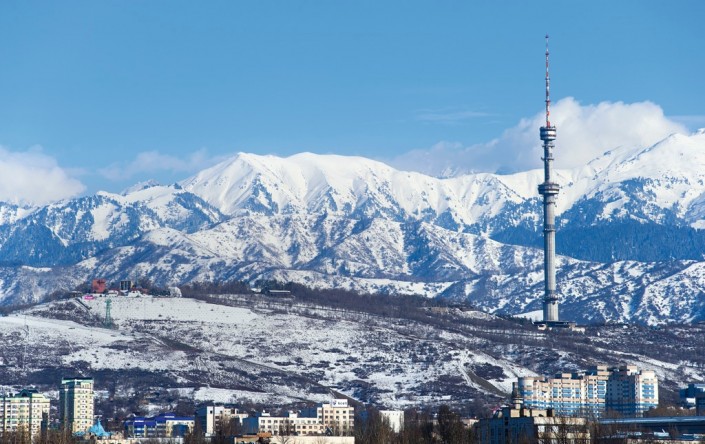Aurora Space hosts evening of indie music

On March 1, the Aurora Space cultural center turned into a realm of independent music. Those who organized the event did their best to turn just a regular evening program into a small music festival.
The program was opened by the duo Balkhash Snitsa, consisting of poet Anuar Duseybinov and composer Rustem Myrzakhmetov. They performed classic spoken word, calm poetry accompanied by fragile electronic music in ethnic style and live guitar music that played from time to time. The performance was quite monotonous and sometimes you couldn’t clearly understand what sounds to focus on. It was like live broadcasting from a «broken alien world.» It was like a hide-and-seek game between sound and words which flew freely around the music hall while being on an eternal quest for the focal point.
After this mysterious performance, guests were ready to listen to the main star of the evening, Saadet Turkoz, a Swiss singer with Kazakh roots. She usually performs Kazakh and Turkish folk songs with some notes of Sufi music, something that The Wire would probably add to the jazz and improvisation section. This time in Aurora, Turkoz sang without any musical accompaniment, which was good for her, I believe. I saw her performance in the middle of the 2000s in Moscow and at the time, the electronic accompaniment was rather annoying. In Aurora, her voice sounded like an ancient mantra, a mix of a lyric song by nomads of the Great Steppe and cradle-song noise.
Sometimes it reminded me of something between Violeta Parra, a folk singer from Chile, and American singer Diamanda Galas. It was kind of an initiatory-ecstatic endeavor to reassemble the world, rather than just music. It was intriguing to observe how this performance absorbs both nomadic freedom and rock-solid tradition. Mircea Eliade, a Romanian philosopher, historian of religion, and professor at the University of Chicago, described this phenomenon as the correlation between tradition and innovation.
The performance by Saadet Turkoz was so great that I couldn’t even imagine that young musicians from Samrattama would be able to surprise anyone in the concert hall that day. But they really did.
Samrattama’s music is also kind of a mix of traditional and modern music. To some extent, this music reminded me of late Soviet-era alternative rock with its eccentric energy (as seen in the costumes and saxophone) and special Soviet underground poetry of the 1980s. On the other hand, they all look like the U.K. post-punk that continues to generate more and more adherers.
The band’s leader Samrat Irzhasov, who debuted with the album Hemingway in Pants three years ago, studied in film school in Almaty and has performed in the theatre. I think his artistic background and vivid appearance would be helpful if the band decides to shoot film clips similar to those by actor and singer Caleb Landry Jones. Nevertheless, this band has huge potential and a promising future even without any film clips.
According to, Ruslan Yakupov, creative producer of the Qazaq Indie label, Samrattama is «one of the most creative and authentic bands in Kazakhstan. Each of their performance is unique as they found themselves in a quest for personal identity, learning the mother tongue we almost forgot and our culture.»
At the end of the evening, we – all guests of the Aurora Space center – enjoyed a performance by Magic of Nomads. This was flawless ethno jazz that made us calm and relaxed after all previous transcendent quests and sound adventures.

